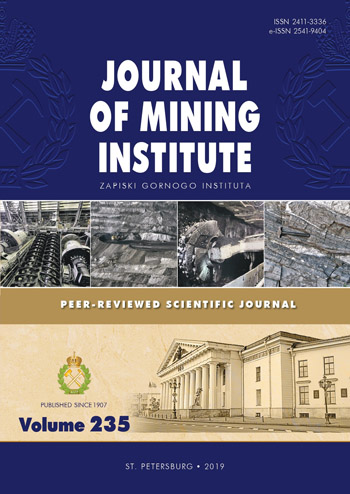Tourmaline as an ondicator of tin occurrences of cassiterite-quartz and cassiterite-silicate formations (a case study of the Verkhneurmiysky ore cluster, Far East)
- 1 — Ph.D., Dr.Sci. Professor Saint-Petersburg Mining University ▪ Orcid
- 2 — Ph.D., Dr.Sci. Professor Saint-Petersburg Mining University
Abstract
The research focused on the composition of tourmaline from tin ore deposits and ore occurrences within the Verkhneurmiysky ore cluster in the Amur region. The aim of the study is to determine the indicative signs of tourmaline from cassiterite-quartz and cassiterite-silicate formations. This research is based on the materials of a long-term study of the mineralogy of the Far East deposits, conducted at the Mining University under the scientific supervision of Professor Yu.B.Marin. The relevance of the study involves predicting of tin and associated mineralization. For the first time, SIMS and Mössbauer spectroscopy were used to study tourmaline from this region. We identified the typomorphic characteristics of the tourmaline composition, which are proposed to be used as indicators of tin-ore deposits. Typomorphic characteristics of tourmaline from cassiterite-quartz formation: schorl (Mg/(Mg + Fe) = 0.06) with a high content of Al and K; Fe3+/(Fe3+ + Fe2+) = 0.03; ZFe3+ = 1 %; impurities: Nb, LREE (La, Ce, Pr), Be, Bi, F, Li, and Mn; LREE content > 9 ppm; positive Gd anomaly. Typomorphic characteristics of tourmaline from cassiterite-silicate formation: schorl-dravite (Mg/(Mg + Fe) = 0.22) with a high Ca content; Fe3+ / (Fe3+ + Fe2+) = 0.17; ZFe3+ = 9 %; impurities: Zr, Y, Cr, V, Sn, In, Pb, W, Mo, Ti, HREE, Eu, Sr, Sb, and Sc; the content of Y is > 2 ppm, of HREE is > 3 ppm, Eu is > 0.1 ppm.
Funding
The work was carried out within the framework of the State Programof the Ministry of Education and Science of the Russian Federation in the field of scientific activities No5.9248.2017/6.7, 2017-2019. We are grateful to I.M.Gembitskaya AND V.G.POVAROV (Saint-Petersburg Mining University,Saint-Petersburg), N.M.Korolev (IPGG RAS,Saint-Petersburg),S.G.Simakin (Institute of Physics and Technology, RAS, Yaroslavl) for the analytical studies
